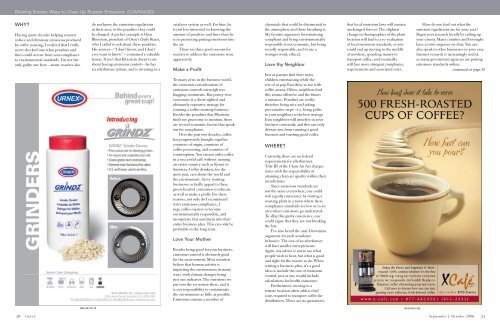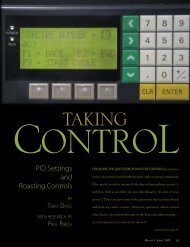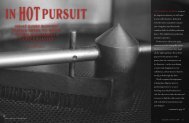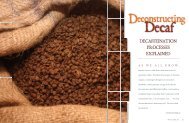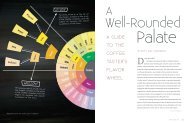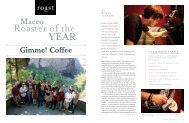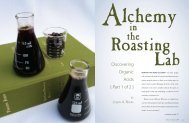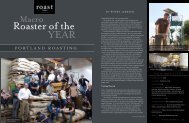Blowing Smoke - Roast Magazine
Blowing Smoke - Roast Magazine
Blowing Smoke - Roast Magazine
You also want an ePaper? Increase the reach of your titles
YUMPU automatically turns print PDFs into web optimized ePapers that Google loves.
<strong>Blowing</strong> <strong>Smoke</strong>: Ways to Clean Up <strong>Roast</strong>er Emissions (CONTINUED)<br />
WHY?<br />
Having spent decades helping roasters<br />
reduce and eliminate emissions produced<br />
by coffee roasting, I realized that I really<br />
never checked into what penalties and<br />
fines could accrue from non-compliance<br />
to environmental standards. I’m not the<br />
only guilty one here—many roasters also<br />
do not know the emissions regulations<br />
in their area, or the penalties they could<br />
be charged. A perfect example is Oren<br />
Bloostein, president of Oren’s Daily <strong>Roast</strong>,<br />
who I called to ask about these penalties.<br />
His answer—“I don’t know, and I don’t<br />
ever want to know”—contained a valuable<br />
lesson. It isn’t that Bloostein doesn’t care<br />
about having emissions control—he has<br />
an afterburner system, and is investing in a<br />
catalyzer system as well. For him, he<br />
is just less interested in knowing the<br />
amount of penalties and fines than he<br />
is in preventing putting emissions into<br />
the air.<br />
There are three good reasons for<br />
roasters to address the emissions issue<br />
aggressively.<br />
Make a Profit<br />
To many of us in the business world,<br />
the economic considerations of<br />
emissions controls outweigh treehugging<br />
sentiments. But penny-wise<br />
economics is a short-sighted and<br />
ultimately expensive strategy for<br />
running a coffee-roasting business.<br />
Besides the penalties that Bloostein<br />
finds too gruesome to mention, there<br />
are several economic factors that speak<br />
out for compliance.<br />
Over the past two decades, coffee<br />
has progressively brought together<br />
countries of origin, countries of<br />
coffee processing, and countries of<br />
consumption. You cannot order coffee<br />
in a successful café without naming<br />
an exotic country such as Kenya or<br />
Sumatra. Coffee drinkers, for the<br />
most part, care about the world and<br />
the environment. Savvy roasting<br />
businesses actually appeal to these<br />
green-hearted consumers to educate<br />
as well as make a profit. For these<br />
reasons, not only do I recommend<br />
strict emissions compliance, I<br />
urge coffee roasters to become<br />
environmentally responsible, and<br />
incorporate this sentiment into their<br />
entire business plan. This can only be<br />
profitable in the long term.<br />
Love Your Mother<br />
Besides being good for your business,<br />
emissions control is obviously good<br />
for the environment. Most scientists<br />
believe that human activity is<br />
impacting the environment in many<br />
ways, with climate changes being<br />
just one indicator. The emissions we<br />
put into the air remain there, and it<br />
is our responsibility to contaminate<br />
the environment as little as possible.<br />
Emissions contain a number of<br />
chemicals that could be detrimental to<br />
the atmosphere and those breathing it.<br />
My favorite argument for remaining<br />
compliant and being environmentally<br />
responsible is not economic, but being<br />
socially responsible, and to use a<br />
stronger word, ethical.<br />
Love thy Neighbor<br />
Just as parents find their noisy<br />
children entertaining while the<br />
rest of us pop Excedrin, so too with<br />
coffee aroma. Often, neighbors find<br />
this aroma offensive and the fumes<br />
a nuisance. Penalties are costly;<br />
therefore being nice and taking<br />
preventative steps—i.e. being polite<br />
to your neighbors is the best strategy.<br />
Irate neighbors will interfere in your<br />
business constantly, and this can only<br />
distract you from running a good<br />
business and roasting good coffee.<br />
WHERE?<br />
Currently, there are no federal<br />
requirements for afterburners.<br />
Title III of the Clean Air Act charges<br />
states with the responsibility of<br />
attaining clean air quality within their<br />
jurisdictions.<br />
Since emissions standards are<br />
not the same everywhere, one could<br />
risk a guilty conscience by starting a<br />
roasting plant in a town where these<br />
compliance standards are low or in an<br />
area where emissions go undetected.<br />
To allay this guilty conscience, one<br />
could argue that they are not breaking<br />
the law.<br />
I’ve also heard the anti-Darwinian<br />
argument for such avoidance<br />
behavior: The cost of an afterburner<br />
will hurt smaller entrepreneurs.<br />
Again, my advice is not to say what<br />
people wish to hear, but what is good<br />
and right for the roaster to do. When<br />
writing a business plan, it’s a good<br />
idea to include the cost of emissions<br />
control, just as one would include<br />
calculations for health insurance.<br />
Furthermore, moving to a<br />
remote location often adds to fuel<br />
costs required to transport coffee for<br />
distribution. There are no guarantees<br />
that local emissions laws will remain<br />
unchanged forever. The slightest<br />
change in demographics of the plant<br />
location will lead to a re-evaluation<br />
of local emissions standards, so you<br />
could end up moving to the middle<br />
of nowhere, spending money to<br />
transport coffee, and eventually<br />
still face more stringent compliance<br />
requirements and associated costs.<br />
How do you find out what the<br />
emission regulations are for your area?<br />
Begin your research locally by calling up<br />
your county. Many counties and boroughs<br />
have a town engineer on duty. You can<br />
also speak to other businesses in your area.<br />
Internet research is increasingly useful,<br />
as many government agencies are posting<br />
emissions standards online.<br />
continued on page 28<br />
Free Info #178<br />
Free Info #180<br />
26 roast September | October 2006 27


